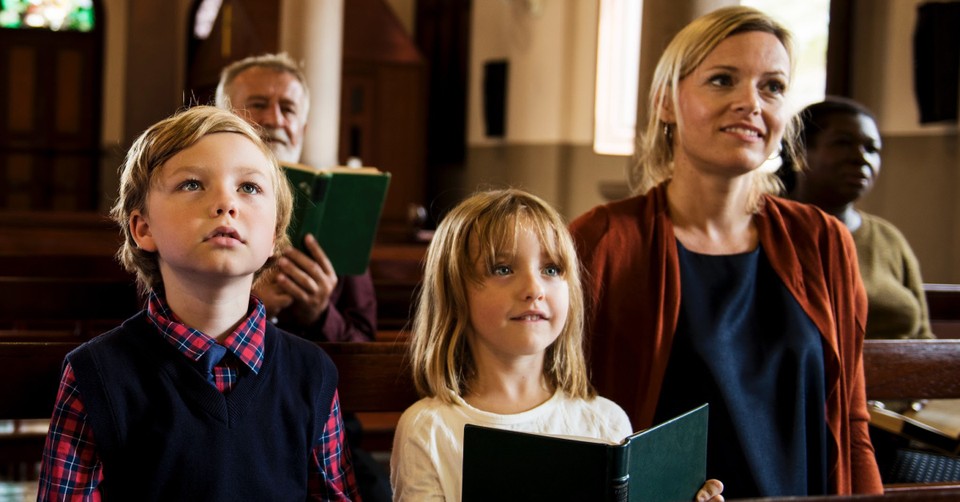13 Things to Know about Baptist Beliefs and Faith

Baptist: it’s one of the most well-known denominations in Protestant Christianity and is aptly named after its main belief in believer’s baptism, where a person chooses to publicly proclaim their faith in Christ by baptism.
There are some 50 million Baptists in the U.S. alone, making it one of the largest groups of Protestants in the nation. The denomination’s diversity is reflected in various sub-groups, such as the Southern Baptist Convention (SBC), American Baptist Churches USA, and Independent Baptist churches. Despite these differences, Baptists are united by core principles including the authority of Scripture, religious freedom, congregational governance and church membership, the priesthood of believers, and baptism by immersion.
Let's take a look at 15 things to know about Baptists and their beliefs.
Photo courtesy: ©Gettyimages/Raw pixel

1. There are a few differing opinions on the origin of the Baptist church.
The origins of the Baptist denomination are a subject of debate among scholars and historians, with four main theories discussed over time. According to Bruce Gourley, former executive director of the Baptist History & Heritage Society, the most widely accepted theory is that Baptists emerged from the English Separatist movement during the 16th to 18th centuries. This movement involved Protestants breaking away from the Church of England, dissatisfied with the slow pace of reform. The first Baptist church is generally traced back to 1609 in Amsterdam, where a group led by John Smyth and Thomas Helwys sought to restore the New Testament model of believers' baptism and congregational independence
Another theory links the origins of the Baptist church to English Separatism with significant influence from Dutch Anabaptists. This theory suggests that early Baptists were heavily influenced by Mennonites, whose teachings focused on adult baptism, pacifism, and separation from state control. The Anabaptists rejected infant baptism, a stance later adopted by the Baptist movement, emphasizing the personal choice of baptism by believers only.
The third and fourth theories propose that the Baptist faith has existed in some form since the time of Christ. Some proponents claim that John the Baptist was the original model for the denomination’s teachings, although this view is symbolic rather than historically verified. Others argue that certain Christian groups through history, such as early church communities or dissenting sects, practiced similar beliefs to those of the modern Baptists, suggesting an unbroken spiritual lineage.
Photo Credit: ©GettyImages

2. The Baptist church started in the 17th century in America.
In America, a former member of the Church of England, Roger Williams, separated from officials in the Massachusetts Bay Colony over his belief about church functions. In 1638, he founded the first Baptist church in America in uncolonized Rhode Island. Also in Rhode Island, Englishman John Clarke founded a Baptist church around the same time. The two men later received a charter from King Charles II guaranteeing religious freedom in Rhode Island.
According to American Baptist Churches USA, by 1790 there were 35 Baptist associations in America and some 560 ministers. Estimates say there were some 750 churches and 60,000 Baptists in the states. Historians say that the Baptist belief in religious freedom was a significant influence on the forming of the First Amendment of the Constitution.
Photo Credit: ©GettyImages

3. Baptist churches are broken up into different sub-denominations.
In the United States, the largest group is made up of the Southern Baptist Convention. As of 2015, the group was made up of more than 15 million members. Southern Baptists who split with northern Baptists founded the Convention in 1845 in Georgia over the issue of slavery.
Other affiliations include smaller conservative organizations (such as the American Baptist Churches USA, Baptist General Conference, and the Baptist General Convention of Texas) of Baptist churches and the Independent Baptist churches that are not part of a hierarchical structure or governing authority. This group started in the late 19th and early 20th centuries and is made up of believers who wanted to adhere to a more conservative doctrine.
There is a Baptist World Alliance, which includes some 200 Baptist organizations and conventions. The Southern Baptist Convention, however, left the Alliance in 2004 over the issues of homosexuality and women in the clergy.
Photo Credit: ©GettyImages

4. The main belief in the Baptist church is Baptism.
The Baptist church believes in baptism only after a person has professed Christ as their Savior. Baptism symbolizes the cleansing of sins.The word "baptism" comes from the Greek word baptizo, meaning "to immerse," which reflects the Baptist practice of full immersion in water. This symbolizes the disciples’ own baptism as stated in John 3. This practice symbolizes the believer’s identification with the death, burial, and resurrection of Jesus Christ in Romans 6:3-4 which says Christians are “buried with him through baptism into death in order that, just as Christ was raised from the dead through the glory of the Father, we too may live a new life.”
Baptists emphasize believer’s baptism, meaning that only those who have made a conscious decision to follow Christ are baptized. This distinguishes them from other Christian traditions that practice infant baptism, which Baptists reject. They believe baptism must be a voluntary act of obedience following personal faith, and infants, being unable to make such a decision, are not baptized in Baptist churches. Instead, some Baptist communities offer infant dedications, where parents commit to raising their children in the faith until they can make their own profession of belief later in life.
Baptism is not a requirement for salvation and the Baptist church sees it is a public expression of faith. “While it is personal, it is not private,” an article from the Southern Baptist Conventions’ journal says. “Such an act of obedience actually then clarifies their testimony and opens the door for ministry in the church.”
Landmark Baptists, a distinct subset within the Baptist movement, take these principles a step further. They adhere to a stricter interpretation of church practices, often teaching that the only valid churches are those with direct lineage to the apostolic tradition, meaning churches founded by Jesus and His disciples. For them, valid baptism can only occur within a true New Testament church, and they sometimes practice closed communion, restricting participation to those within their own congregations. This emphasis on the continuity of the church and exclusivity in baptism sets them apart from more mainstream Baptist practices.
Photo Credit: ©GettyImages/Jose antonio Sancehes reyes

5. Baptists are traditionally strong believers in Biblical authority.
Since the origins of the church, Baptists have said the Bible is the only authority for Christian faith and practice. Baptists believe that the Bible is the only authority because it is divinely inspired or has a divine nature.
2 Timothy 3:16-17 is an oft-cited example of why Baptists believe strongly in the Bible. The verses say, “All Scripture is God-breathed and is useful for teaching, rebuking, correcting and training in righteousness, so that the man of God may be thoroughly equipped for every good work.”
The Holy Spirit inspired the Bible and empowered men to record the truth about God and give directives on how to apply the Bible to the Christian life. Some Baptist churches may disagree on certain practices, but many say the Bible is their sole authority.
Baptist confessions are statements of faith used to summarize core beliefs and guide churches on doctrinal matters. These documents outline Baptist views on Scripture, salvation, church practices, and governance. Unlike creeds in other traditions, Baptist confessions emphasize the autonomy of local churches and individual believers, offering guidance without being seen as binding or infallible.
Some of the most influential Baptist confessions include the First London Baptist Confession of 1644, the Second London Baptist Confession of 1689, the New Hampshire Confession of 1833, and the Baptist Faith and Message (2000). These documents have helped shape Baptist theology, emphasizing believer’s baptism, congregational governance, and the authority of Scripture.
Confessions are often used for teaching, ordination, and new member classes, providing clarity on key doctrines while still allowing room for individual interpretation.
Photo Credit: ©GettyImages.com

6. Baptists have differing beliefs about Calvinism versus Arminianism.
Often considered a major division in the Protestant church is Calvinism vs. Arminianism. Calvinism is named after John Calvin, a theologian and pastor during the Protestant Reformation. The major tenant of Calvinism is predestination, where some people are predestined to be saved. That is, God decided the destiny of some with salvation by grace. Others are meant for damnation due to their original sin.
In Arminianism, named after Jacobus Arminius, the teachings say that God has chosen us to bring salvation to all and people have the ability to make the decision for faith.
Even within Calvinism and Arminianism in the Baptist church, there are differing beliefs and many conversationsabout it. The Southern Baptist Convention itself has held many conferences centering on the long-standing Protestant debate.

7. The Lord’s Supper is a symbolic act of obedience.
In the Baptist church, the Lord’s Supper, also known as communion, is a symbolic practice meant to honor the death of Jesus. Communion is not necessary for salvation.
The practice comes from Jesus’ Last Supper with his disciples. At the meal, unleavened bread and wine were served. The bread symbolizes the purity of Christ and the wine (sometimes grape juice) symbolizes the blood of Christ that was shed for his people.
The Lord’s Supper is meant as a remembrance of Christ’s sacrifice on the cross. Unlike other denominations of Christianity, such as the Catholic church, the Lord’s Supper is not literally the blood and body of Christ.
There is no set calendar for partaking in the Lord’s Supper among Baptist churches, but each time it is practiced, it is meant to be a time of devotion and prayer. In many churches, all are able to participate in the Lord’s Supper.
8. Church Membership is Important to Baptists
Baptists view church membership as a deep commitment to actively participate in the life of the local church, based on the biblical teachings of Matthew 16:18 and Matthew 18:15-20. In Matthew 16:18, where Jesus says, “I will build my church, and the gates of Hades will not overcome it,” Baptists see this as Jesus establishing the importance of the local church as a visible representation of His kingdom on earth.
Membership typically requires professing faith in Christ and baptism by immersion, which follows a believer’s conscious decision to follow Jesus. This emphasizes the Baptist belief in a regenerate church membership, meaning that only those who have personally experienced salvation should become members of the church community. New members often undergo discipleship or membership classes to understand the church’s mission, statement of faith, and expectations. In these classes, candidates learn about serving through spiritual gifts, participating in communion, and being involved in the church’s ministries and outreach efforts. Membership also implies a level of accountability, where members commit to regular worship, prayer, giving, and mutual encouragement within the community.
In Matthew 18:15-20, Jesus provides a framework for church discipline and accountability. Baptists apply this passage by emphasizing that church membership involves mutual responsibility, where members are accountable to each other and to the congregation. If a member strays from biblical teachings or behaves contrary to the faith, the church practices loving correction and restoration, as outlined in this passage.
Photo Credit: ©GettyImages

9. Baptists strongly encourage evangelism and missionary work.
In response to Christ’s call to “make disciples of all nations,” many Baptists encourage missionary work and evangelism opportunities. Baptists say that millions of people around the world have not heard of Jesus and evangelism is the mission of sharing Christ’s message. Evangelism has a long history in the Baptist church. According to the American Baptist Churches USA, historians used books, tracts, and other resources in evangelism as early as 1824.
Former evangelist, Billy Graham’s events have inspired waves of new evangelistic conferences and conventions, which draw in millions of people. Locally, Baptists encourage each other to share their faith openly and take the message of Christ to their neighbors, workplaces, schools, and other day-to-day activities. Baptists believe in a “calling” to share the gospel and in many churches, Baptists are learning to adapt their approach to better deliver the message of Christ.
10. Autonomous Local Churches
Baptists believe in the principle of church autonomy, meaning each local congregation is self-governing and independent from any external authority or hierarchical structure. This belief reflects the conviction that Christ alone is the head of the church (Colossians 1:18), and each church is accountable to Him rather than to denominational or governing bodies.
Church autonomy allows local congregations to make decisions about doctrine, worship practices, leadership, and finances without interference from a centralized authority. This means that individual Baptist churches can call and ordain their own pastors, determine membership policies, and manage their ministries according to their understanding of Scripture. While some churches may affiliate with larger bodies, such as the Southern Baptist Convention (SBC) or American Baptist Churches USA (ABCUSA), these affiliations are voluntary and do not diminish the autonomy of the local church. The conventions exist primarily for cooperation in missions and resources rather than to govern local congregations.
Baptists believe that each church is equipped through the Holy Spirit to discern God’s will for its community, which reflects the principle of congregational governance. Major decisions are typically made by members of the church through voting in business meetings, giving every member a voice in matters such as leadership selection, budgeting, and ministry focus. This practice aligns with their interpretation of Matthew 18:20 ("where two or three gather in my name, there I am with them"), reinforcing the idea that decisions made within the community are guided by God.
Photo Credit: ©GettyImages

11. Baptists are supporters of religious freedom.
Aligning with Thomas Jefferson, early Baptists held strongly to a view that supported religious liberty. Facing some persecution for their own belief in believer’s baptism, Baptists endured fines, harassment and sometimes jail time. In Massachusetts 1645, for example, the colony outlawed Baptists, calling them “the troublers of churches in all places,” according to the Ethics and Religious Liberty Commission of the Southern Baptist Convention.
In response to that persecution, Baptists later helped influence the First Amendment. The early church believed in separation in church and state so that religious liberty was available to all and all were free to practice as they saw fit. With the First Amendment, Baptists supported “free exercise of religion” and not a “national pastor.”
12. The Priesthood of Believers
Baptists strongly embrace the concept of the priesthood of all believers, which teaches that every Christian has direct access to God through faith in Jesus Christ, without the need for a human mediator like a priest. This principle is rooted in passages such as 1 Peter 2:9, which refers to believers as “a royal priesthood,” and Hebrews 4:16, which encourages Christians to approach God’s throne of grace with confidence. It reflects the belief that all believers have equal standing before God and can personally engage in prayer, Bible study, and worship.
This doctrine aligns with the Baptist emphasis on personal faith and responsibility. Since each believer is considered a “priest” in their relationship with God, they are encouraged to participate actively in the church’s life through service, evangelism, and teaching. This principle also shapes congregational governance, where members have a voice in church decisions, recognizing that God can work through any believer—not just clergy.
The priesthood of believers does not mean complete individualism; rather, Baptists emphasize that believers are called to serve one another within the church community. Each Christian is entrusted with using their gifts to build up the body of Christ, contributing to the church’s spiritual health and outreach.
Photo Credit: ©GettyImages

13. About 35 million Americans profess as Baptist.
As of 2024, Baptists remain a significant presence in the United States, although their numbers have shifted slightly in recent years. The Southern Baptist Convention (SBC), the largest Baptist group in the U.S., reports around 13 million members spread across 46,500 churches. This reflects a gradual decline in membership over the past few years, although attendance and baptisms have begun to rebound following the COVID-19 pandemic. In 2023, the SBC saw over 4 million weekly attendees and more than 226,000 baptisms—an encouraging sign of growth in evangelism and church engagement efforts.
In contrast, American Baptist Churches USA (ABCUSA), another major Baptist group, includes approximately 5,000 congregations with 1.3 million members. Together, these numbers highlight the diversity and scale of Baptist influence across the U.S. and globally.
According to recent reports, about 36% of evangelical Protestants identify with some form of Baptist denomination.
Related Resource: Alan Noble | You Are Not Your Own: Resisting the Gospel of Radical Autonomy
What if the crushing weight of modern life isn't a bug in the system but a feature of a false belief? In this episode of Thinking Christian, Dr. James Spencer is joined by Dr. Alan Noble to explore his compelling book, You Are Not Your Own. Together, they unpack why our culture's demand to “define yourself” leads to despair, and how belonging to Christ—not ourselves—is the good news we’ve been trained to forget. Drawing from the Heidelberg Catechism, zoocosis, and Sylvia Plath, this conversation dives deep into anthropology, social pressure, identity, and the role of the Church in resisting cultural formation. A quietly radical episode that reminds us that true freedom isn’t found in self-expression, but in surrender. Listen in, and be sure to subscribe on Apple or Spotify so you never miss an episode!
Photo Credit: ©GettyImages
This article is part of our Denomination Series listing historical facts and theological information about different factions within and from the Christian religion. We provide these articles to help you understand the distinctions between denominations including origin, leadership, doctrine, and beliefs. Explore the various characteristics of different denominations from our list below!
Catholic Church: History, Tradition & Beliefs
Jehovah's Witnesses & Their Beliefs
Mormons: The Church of Latter-Day Saints & Their Beliefs
Baptist Church: History & Beliefs
Presbyterians: History & Beliefs
Mennonites & Their Beliefs
United Methodist Church: History & Beliefs
Seventh-Day Adventists & Their Beliefs
The Pentecostal Church: History & Beliefs
Lutheran History & Beliefs

Originally published February 09, 2021.








